Governance in Europe
Gary Marks, Series Editor
Regional Integration and Democracy
edited by Jeffrey J. Anderson
The New Political Economy of EMU
edited by Jeffrey Frieden, Daniel Gros, and Erik Jones
A Wider Europe
by Michael Baun
Policy and Process in the New Europe
by Jessica R. Adolino and Alan N. Katz
ROWMAN & LITTLEFIELD PUBLISHERS, INC.
Published in the United States of America
by Rowman & Littlefield Publishers, Inc.
4720 Boston Way, Lanham, Maryland 20706
http://www.rowmanlittlefield.com
12 Hids Copse Road
Cumnor Hill, Oxford OX2 9JJ, England
Copyright 2000 by Rowman & Littlefield Publishers, Inc.
All rights reserved. No part of this publication may be reproduced, stored in a retrieval system, or transmitted in any form or by any means, electronic, mechanical, photocopying, recording, or otherwise, without the prior permission of the publisher.
British Library Cataloguing in Publication Information Available
Library of Congress Cataloging-in-Publication Data
Schmitter, Philippe C.
How to democratize the European Unionand why bother? / Philippe C. Schmitter.
p. cm.(Governance in Europe)
Includes bibliographical references and index.
9781461637486
1. European Union. 2. Democratization-European Union countries. I. Title. II. Series.
JN30.S344 2000
341.2422dc21 99-053003
Printed in the United States of America
 The paper used in this publication meets the minimum requirements of American National Standard for Information SciencesPermanence of Paper for Printed Library Materials, ANSI/NISO Z39.48-1992.
The paper used in this publication meets the minimum requirements of American National Standard for Information SciencesPermanence of Paper for Printed Library Materials, ANSI/NISO Z39.48-1992.
Preface
This is a relatively short book, but it has had a long trajectory. It began when I was fortunate enough to have been invited to be a visiting professor at the Centro de Estudios Avanzados en Ciencias Sociales of the Instituto Juan March during the spring of 1996for which I wish to thank its codirectors, Jos Maria Maravall and Jos Ramon Montero. In the institutes splendid facilities, I got the idea that it might be fruitful if I tried to combine two seemingly disparate research interests: democratization at the national level and integration at the European level. Thanks to its very competent and helpful staff, especially Marta Peach and Jackie de la Fuente, and the stimulus provided by the doctoral students in my seminar The Theory and Practice of European Integration, I produced a first draft of this manuscript that I presented in a series of public lectures in Madrid. While I cannot claim that these lectures were an instant hit, they did help me to recruit Jos Ignacio Torreblanca, who subsequently worked with me on the decision-making scheme that is presented here in revised form in chapter 4.
After a brief interval at Stanford University, I accepted a position at the European University Institute (EUI), where I found just the right atmosphere among its faculty, staff, and ricercatori to pursue the matter further. In seminars at the Badia overlooking Florence, I was literally inundated with helpful criticisms and suggestions. The presence there of the Centre Robert Schumann was important in encouraging me to develop further the more praxis-oriented and reformist aspects of the manuscript, especially my thoughts on the issue of constitutionalization in chapter 5. Eva Breivik was her usual helpful self and even put up with several hysterical struggles between me and my computer. More often than not, it was Bernard Gbikpi who managed to get me untangledand who did a great deal to polish up the final footnotes and bibliography. Ian Gough and the other participants in the European Forum on The Future of the Welfare State (199899) provided some very useful criticism of my initial thoughts concerning a possible extension of social citizenship to the European Union that are presented in the excursus at the end of chapter 2.
Bits and pieces of various versions of this manuscript have been discussed before many other audiences, including the Cellule de Prospective of the European Commission, where it received a polite but reserved reception. One of the participants came up to me afterward with a horrified look on his face and asked, Do you know what you have done with that voting scheme of yours? I, of course, said, No. What have I inadvertently done? Reinvented the Holy Roman Empire! was his answer. Subsequent research on my part has revealed that he was (partially) correct.
These exchanges and those I have constantly had with colleagues and students at the EUI have, no doubt, improved the quality of the final product. Especially, they have helped me to anticipate many of the difficulties and objections that even the modest reforms I propose are bound to generate. As Machiavelli once said:
There is nothing more difficult to execute, nor more dubious of success, nor more dangerous to administer, than to introduce a new system of things: for he who introduces it has all those who profit from the old system as his enemies and he has only lukewarm allies in all those who might profit from the new system. ( The Prince, VI, 94)
I cannot claim that all of my suggestions for reforming a more democratic European Union will be equally compelling or likely to be taken seriously. No doubt, many will be dismissed by both those defending the old order and those not yet confident that a new one is possible. My (self-assigned) task has been to provoke as wide-ranging a debate as possible on an issue that has just begun to receive the attention it deserves.
I cannot thank each of those who helped me in this task individually. The list would be too long, but they know who they are, and some may even be able to spot exactly the passages where their contributions were registered. One person, however, is all over the book, even though we have rarely discussed it explicitly since it lies outside her usual wide range of interests: Terry Karl, my intellectual camarade de longue date.
I also absolve everyone but myself for any responsibility for the errors and omissions that inevitably remain.
Euro-democracy: Introduction
My intention in this book is to explore the possibility and the desirability of democratizing the European Union (EU). In this chapter, I analyze the EU as an emerging polity with certain distinctive features when contrasted with the existing nation-states that are its members. Its status as a nonstate and a nonnation poses some very challenging problems with regard to its eventual democratization. Should this ever be seriously attempted, I argue, it will be necessary to reinvent the key institutions of modern political democracy: citizenship, representation, and decision making. In chapters 2, 3, and 4, I suggest what some of these reinventions might be in the form of modest proposals for reform in each of these three dimensions. For it is my conviction that the EU has neither the political will nor the functional necessity to democratize itself tutto e subito completely and immediately. The only feasible strategy is to apply the method that Jean Monnet used to initiate Europes economic integration in the 1950s to its political integration in the first decades of the twenty-first century. One has to start with petits pas and exploit them incrementally to produce grands effets. Moreover, under present conditions and foreseeable future scenarios, there will be no widespread and spontaneous pressure to do so from below. The initiative for regime change in the EU has to come from above or from withinthat is, from its member states or its internal institutions. Finally, in chapter 5, I take up the issue of Why bother? and, especially, Why bother now? Given the manifest absence of a widespread desire on the part of Europeans for Euro-democracy and the equally obvious reluctance of the Eurocrats in Brussells to take such a risk, why is it so imperative to begin the process of democratization soon? Part of the answer I find in the imperatives likely to be generated in the near future by eastern enlargement and monetary unification. The rest I find in the need for the process of European integration to replace its exhausted strategy of exploiting economic interdependencies with a new one of generating transnational political alliances and loyalties.

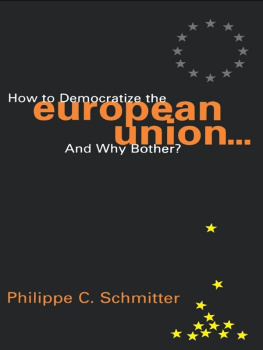

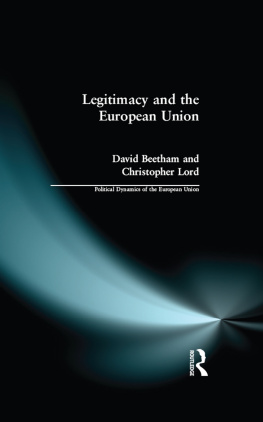
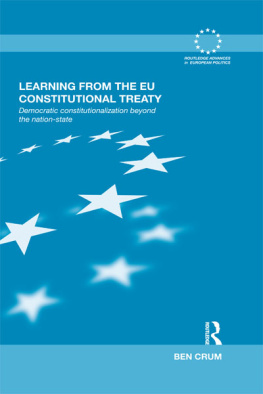

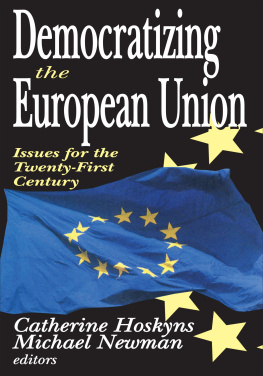
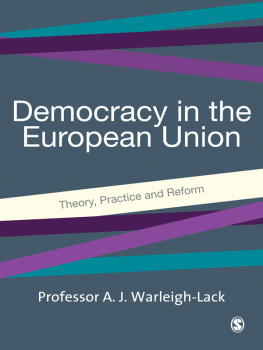
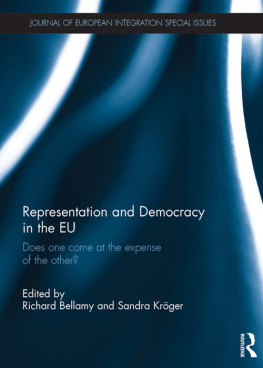
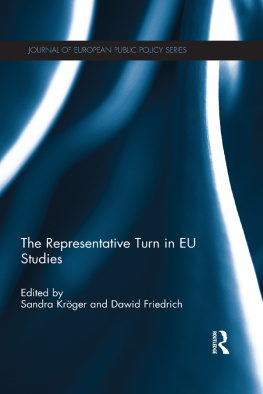
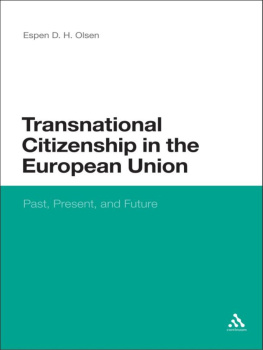
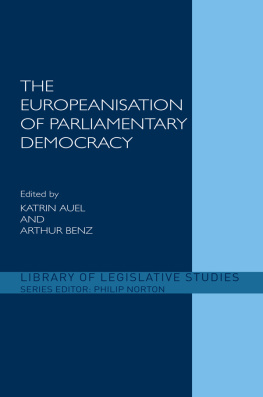
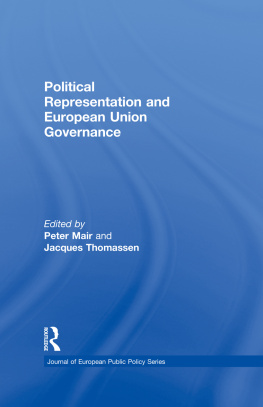
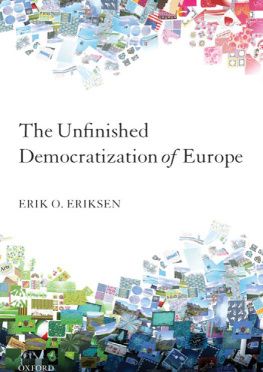

 The paper used in this publication meets the minimum requirements of American National Standard for Information SciencesPermanence of Paper for Printed Library Materials, ANSI/NISO Z39.48-1992.
The paper used in this publication meets the minimum requirements of American National Standard for Information SciencesPermanence of Paper for Printed Library Materials, ANSI/NISO Z39.48-1992.